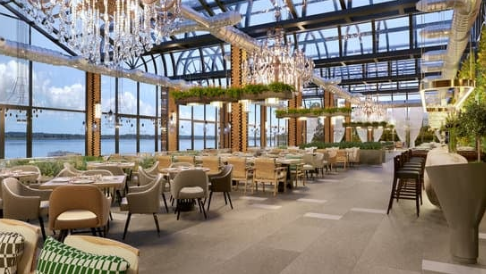Top 5 Things Tenants Should Look for in a Commercial Restaurant Lease
Posted Friday, July 28, 2023 by Kim Sandher

Here are the top five things a tenant should look for in a commercial restaurant lease:
1. Lease Term and Renewal Options:
The lease term refers to the duration of your tenancy. As a tenant, you'll want to negotiate a lease term that provides enough time to recoup your initial investment and build a loyal customer base. Additionally, consider seeking renewal options that give you the right to extend the lease at least once when the initial term expires so you are not scrambling to find a new location or having to move after building the loyal customer base. Having the ability to renew will provide stability and save you from the hassle of relocating your restaurant.
2. Rent and Additional Costs:
Understanding the rent structure is vital. Apart from the base rent, inquire about any additional costs, such as common area maintenance fees, property taxes, insurance, or utilities that you will have to pay on top of the rent each month. Negotiate the rent amount to ensure it is competitive and aligns with the local market rates. It's always a good idea to explore the market and find out what similar spaces are renting for. Be cautious of any clauses that allow the landlord to increase the rent drastically over time.
3. Permitted Use and Zoning:
Ensure the lease explicitly permits the operation of a restaurant in the space you're leasing and check to make sure you are not restricted from carrying certain items, types of food, or certain operating hours. You should also verify the zoning laws with the city or county to confirm running a restaurant is allowed in that particular location. Avoid potential conflicts by clarifying these aspects in the lease agreement before you sign anything.
4. Maintenance and Repairs:
A well-maintained restaurant is crucial for attracting customers and ensuring smooth operations. Review the lease to determine who is responsible for maintenance and repairs—whether it's the tenant or the landlord. Ideally, the landlord should be responsible for major structural repairs, while the tenant may be accountable for minor repairs and maintenance within the leased premises.
5. Assignment and Subletting:
The future may hold unforeseen circumstances where you might need to transfer your lease to another party, sublet a portion of the space, or sell all or part of your business. Clarify the terms related to assignment and subletting in the lease agreement. Some leases might require the landlord's consent, while others may prohibit such transfers altogether. Flexibility in this regard can be advantageous should you need to make changes to your business in the future.
Leasing a commercial space for your restaurant is a significant commitment, and carefully examining the terms of the lease is essential to protect your interests and ensure a prosperous business venture. Always seek legal advice from a qualified attorney before entering into any lease agreement to make sure your rights are safeguarded and the lease terms are fair and reasonable.
